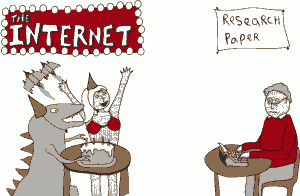I’ve been working my way through a list of books Maria Popova posted last month: seven must-read books on the future of the internet. Since reading Nick Carr’s The Shallows a few months ago, I’ve been extremely aware of the time I spend on the internet, and really try to think about how I use it. Carr’s book actually made me take a step back, use my computer a bit less (for a week or two), and wonder if Nick Carr is right, that maybe the internets are making us stupid. The internet has certainly changed the way I function on a day-to-day basis, as I find myself increasingly attached to both my laptop and Android smartphone.
The Battle: Internet vs Book
From approximately age seven until eighteen, I had a pretty standard routine before I went to bed. I would lay in bed and read a book until I felt tired, often spending hours tearing through books, staying up until 3 in the morning (on a school night too, nonetheless) to finish whatever I was reading at the time.
Then in 2003, I went to university, and by necessity (the room was tiny) had a computer beside my bed in my dorm room. Ever since, there’s been an increasing amount of nights in which I grapple with the choice of reading a book until I fall asleep, or turning on my computer (or more recently, using my smartphone) to browse the internet. More often, I turn to the computer rather than the book, and I realize that I’m not alone. Other people are going through the same thing, and they’re writing books about it. Reading thought-provoking books (such as those found on Popova’s list) about the internet’s effects has made me extremely self-aware of the changes happening in our world. I have been trying to figure out just what it is that makes me turn to my laptop or smartphone instead of a book. Perhaps it’s fitting that I am coming to a better understanding of why this is… by reading books.
On a sidenote, speaking of smartphones, this month will mark my one-year anniversary of owning a smartphone, Google’s flagship Android phone, the Nexus One. Just eighteen months ago, I was one of those people who said, “I don’t need the internet on my phone! I’m distracted by the net at home enough as it is.” But once you’ve lived with a smartphone, and all the conveniences an instant connection to the internet offers, it’s hard to go back. My phone functions as a newspaper, the yellow pages, an e-reader, a map of the world, a GPS system, a camera, an mp3 player, a restaurant guide, and a connection to social circles through text messages, Facebook, and Twitter. E-mail and Facebook messages are becoming instantaneous, with avid smartphone users expecting a reply within a few hours. What will our world be like in twenty, thirty, or forty years? Will we even read books anymore?
Typing this out is making me realize that I should finish up this post and get back to reading. Next up on the list for me is Clay Shirky’s Cognitive Surplus, which after a few chapters, is strengthening my belief that this is a profound shift we’re experiencing as a society, as we move further into the digital age.

3 Comments
So then what would you say to those of us who still living in a non-smartphone world? Are we being left behind, or are we doing ourselves a service?
Tough question with plenty of advocates on either side, but ultimately I have to lean towards the you’re being left behind camp. Like it or not, technological change will occur. There were people who resisted the change to a print culture in the 15th and 16th centuries, and before that there were people who resisted the change from an oral to a written culture. It’s how we react and adapt to the changes that’s important, and I think being aware that the transition is occurring is a good first step. So yeah, the internet is taking over in all realms of life, but hopefully not at the expense of the book as an art form. I have to fear a world where we have all become accustomed to reading fragmented short bits of text in the form of news shorts, text messages, Twitter, and Facebook at the expense of more well-structured, expansive writings such as essays, novels and non-fiction books. Here’s to e-Readers taking off!
The solution is most likely follow the middle path. Have a smartphone but be selective how you use it. It’s going to become increasingly necessary to have and use technology like smartphones but you still can control how much it comes into your life outside of what is necessary.